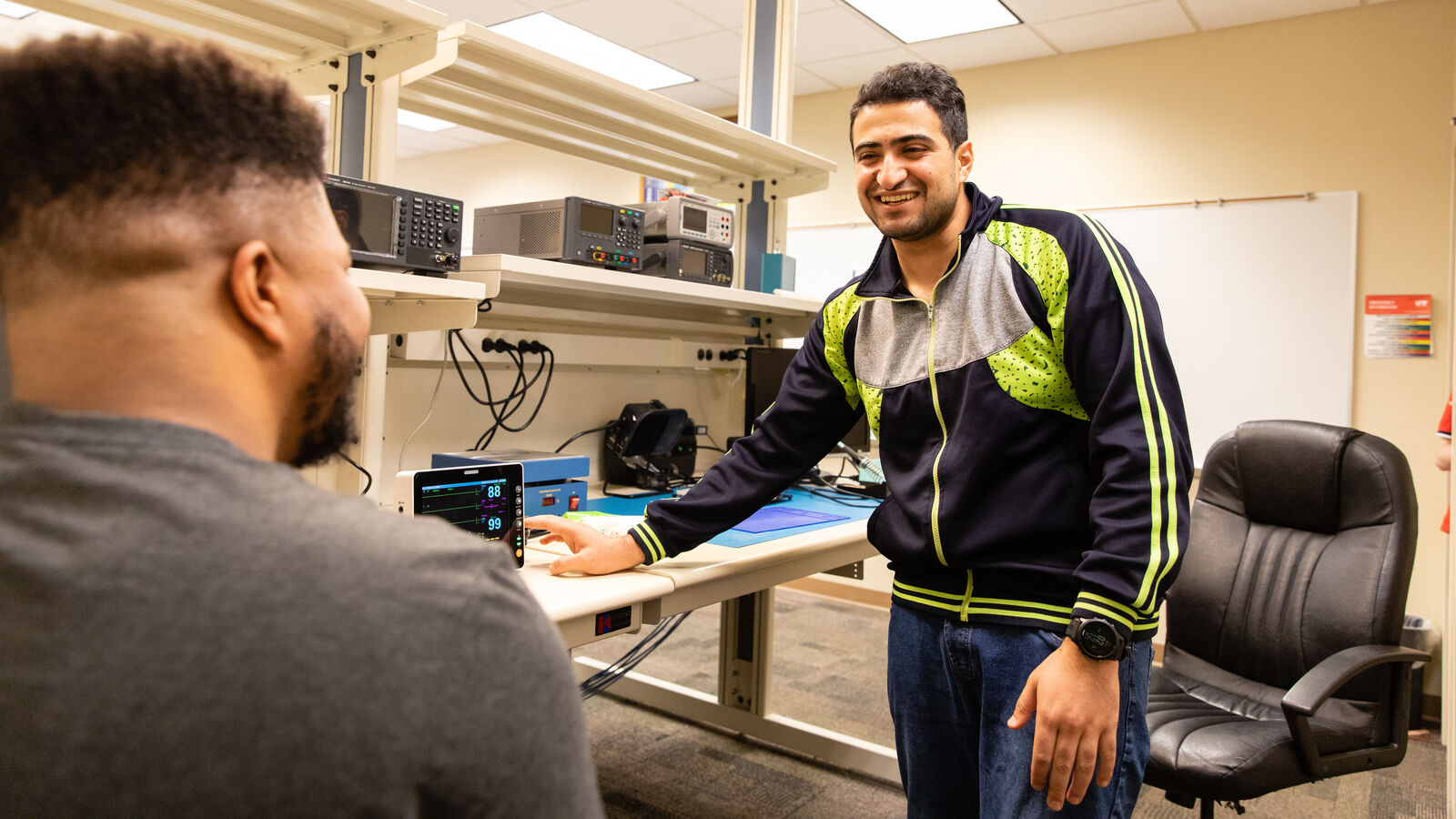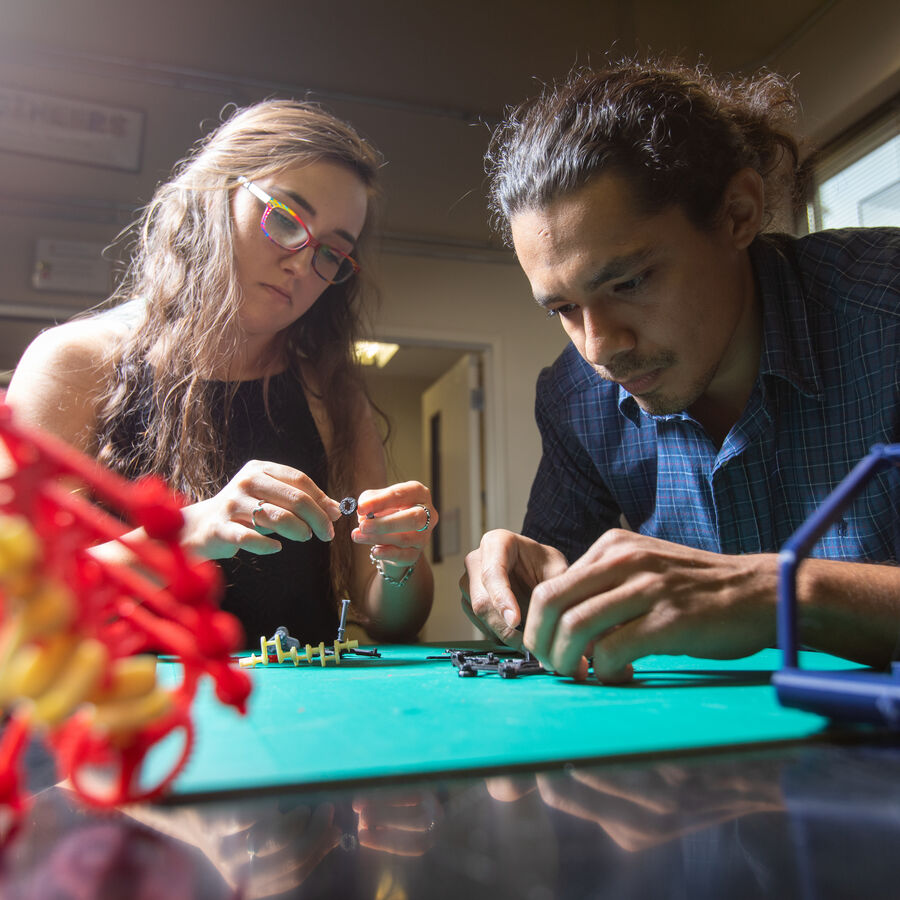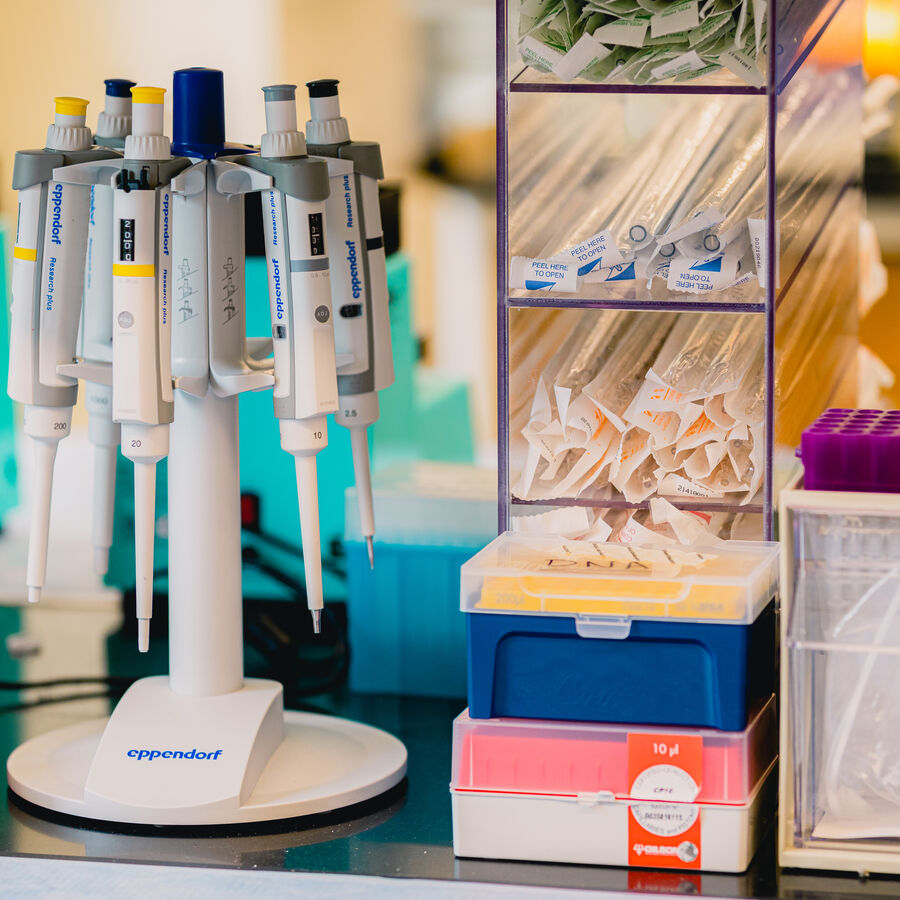
Master of Science in Electrical Engineering
Accelerate Your Engineering Career
You’re a dedicated engineering professional who is ready for what’s next. Deepen your expertise and move your career forward with a Master of Science in Electrical Engineering (MSEE) from The University of Texas at Tyler.
Train with experienced faculty engaged in cutting-edge research, and develop your knowledge of in-demand areas like power systems, communications, sensors, devices and computer technology. Choose a thesis option to conduct your own research or a non-thesis format for advanced coursework in a focused subfield. Either way, the program equips you with more specialized skills and knowledge to anticipate your next career move.
Why Earn a Master’s in Electrical Engineering at UT Tyler?
Electrical engineers are a driving force behind the innovations that enable economic growth, solve challenging technological problems and increase energy efficiency. Maybe you would like to strengthen your professional credentials for positions of greater responsibility and pay. Or, you need specialized training to move into a new area of interest. Perhaps you are drawn to research and want to take your initial step toward doctoral studies.
Whichever goal you are moving toward, UT Tyler helps you get there:
- Expert Faculty Mentors: Learn from seasoned pros with extensive industry and research experience. Our faculty include a professional consultant in electric power systems and electromagnetic interference, a principal investigator in the development of wearable biosensors for preterm infants, an extramurally funded principal investigator in the development of wearable and flexible sensors and systems for sustainable and climate-smart agriculture, food safety, climate change mitigation, and precision medicine, and an editorial board member for the Journal of Real-Time Image Processing. Students participate in labs to gain hands-on experience in cutting-edge research.
- State-of-the-Art Facilities: Get hands-on experience in innovative laboratory environments, including the Center for Advanced Sensors and Big Data Analytics, the Biosensors and Bioinformatics Laboratory and the Trane Residential Heating and Cooling Research Lab.
- Maximum Flexibility: Find room for your studies as a working professional with a schedule built with your needs in mind. Our Houston Engineering Center gives you another option to take courses at a convenient location close to the action.
- A Focus That Fits Your Career: Deepen your expertise in two subdisciplines of your choice, including electronics, power systems, communications, computer systems and other strategic areas.
- Career Fast-Track: Earn your master’s degree more quickly, and get a head start on your career. For electrical engineering undergraduate students at UT Tyler, our BSEE/MSEE Straight-Through option (4+1) lets you graduate with both degrees in just five years.
- Affordability: Build your professional skills without building a burden of debt. We offset our already-low tuition with graduate assistantships, scholarships and other forms of financial support.
Curriculum
The master’s in electrical engineering is a 30-credit-hour course of study you can complete in two years. Our student-centered, hands-on approach gives you the ability to tailor your studies to match your career goals. The program is available in two formats:
- Thesis: The thesis option is ideal for those who want to independently explore an engineering problem or prepare for advanced studies and a research-focused career. Students complete 24 credit hours of coursework plus six hours of thesis research, leading to a written thesis and an oral defense.
- Non-Thesis: If you’re a practitioner who wants to enhance your technical skills or deepen your expertise in a particular area, the non-thesis option allows you to choose two specialties to focus on in your coursework. Options include: electronics, power systems, controls, advanced engineering mathematics, signal processing, communications, real-time systems, computer systems, electromagnetic and power electronics.
Whichever option you choose, students graduate ready to:
- Apply knowledge at a graduate level in areas of focus and draw upon a deepened understanding across the discipline.
- Use modern engineering tools for analysis and design as applied to engineering problems.
- Apply principles of advanced mathematics, including probability and statistics, to engineering problems.
- Deploy systems design approaches, including modeling and simulation of interacting subsystems, to complex engineering problems.
- Demonstrate application of design methodology by comparing and evaluating solutions to engineering problems.
- Communicate effectively in oral, visual and written contexts from a technical perspective.
See All MS in Electrical Engineering Degree Requirements Visit the Electrical Engineering Department
What Can You Do With a Master’s in Electrical Engineering?
Help drive innovation in East Texas and beyond. Your degree prepares you to work as an electrical or electronics engineer in roles in research and development, manufacturing, communications infrastructure or engineering services. UT Tyler’s areas of focus equip you for jobs in specializations, including:
- Analog and digital electronics
- Biosensors and devices
- Communications
- Computer engineering
- Control systems
- Digital signal processing
- Electrical circuit design
- Energy conversion
- Microelectronics
- Power systems
Your skills and training as an engineer can translate into exciting and rewarding opportunities in related areas. Consider positions like:
- Computer Hardware Engineer
- Computer Network Architect
- Network and Computer Systems Administrator
- Sales Engineer
Or, pioneer new research and train tomorrow’s engineering professionals through a career in academia. Select the thesis option to prepare to pursue your doctorate in engineering. Our MS graduates have successfully secured PhD positions at renowned R1 universities, including Tufts University, The University of Texas at Dallas and the University of Arkansas.
How to Apply
Students entering the Master of Science in Electrical Engineering program should have a background equivalent to that of students graduating from the Bachelor of Science in Electrical Engineering (BSEE) program offered at The University of Texas at Tyler. Your bachelor’s degree must be from an ABET-accredited program.
Students who have not earned such a degree are required to complete prerequisite coursework before starting the MSEE program, as determined by the MSEE Graduate Coordinator.
To be considered for admission, please submit or provide proof of:
- A completed online application.
- Official transcripts for all prior college- or graduate-level work, submitted to the Office of Graduate Admissions.
- A satisfactory grade point average on your last four semesters of academic study and the last 60 semester credit hours of upper-division undergraduate or graduate courses.
- A demonstrated proficiency in the use of the English language, both spoken and written.
- A résumé.
This path to the MSEE is available only to UT Tyler undergraduate students intending to complete a Master of Science in Electrical Engineering after their BSEE degree without interruption.
Students are provisionally admitted to and must start the straight-through program in the fall of their senior year. Students are fully admitted upon satisfactory completion of all BSEE graduation requirements and the MSEE program admission requirements.
When you’re a working professional, fitting your coursework within your busy schedule can be a challenge. That’s why, in addition to our main campus in Tyler, we also offer the master’s in electrical engineering program through our Houston Engineering Center for those who work in or near the city. At the HEC, students learn from the same outstanding faculty and enjoy hands-on lab courses for experiential learning. Get the same great program closer to home.
February 28
Application deadline for summer admission for international students.
April 15
Application deadline for summer admission for domestic students.
April 30
Application deadline for fall admission for international students.
August 15
Application deadline for fall admission for domestic students.
October 1
The Free Application for Federal Student Aid opens for the upcoming academic year.
October 30
Application deadline for spring admission for international students.
December 20
Application deadline for spring admission for domestic students.
Explore Related Programs
Next Steps
Your future starts here. Get ready for your next move as an electrical engineer at UT Tyler.


